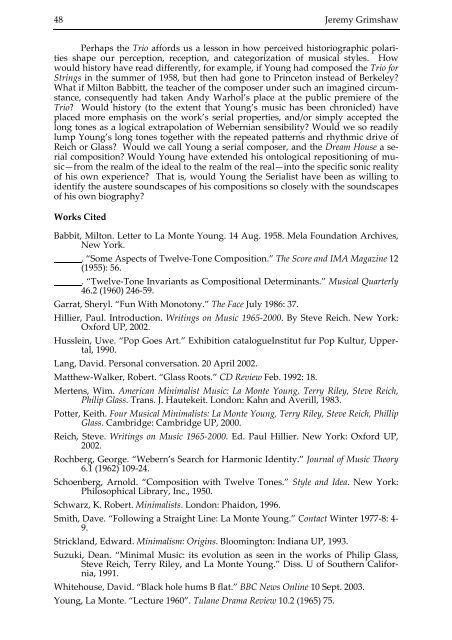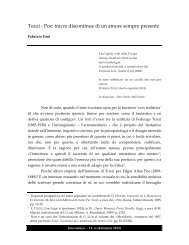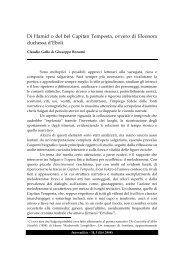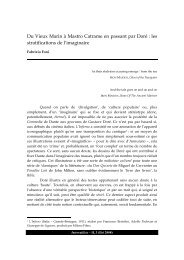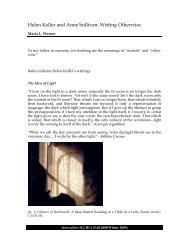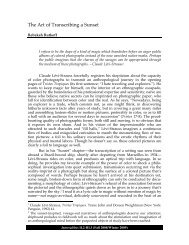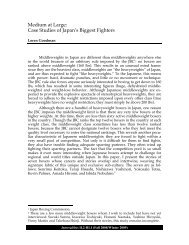The Tabula (not so) Rasa: La Monte Young's Serial Works ... - Cipa
The Tabula (not so) Rasa: La Monte Young's Serial Works ... - Cipa
The Tabula (not so) Rasa: La Monte Young's Serial Works ... - Cipa
You also want an ePaper? Increase the reach of your titles
YUMPU automatically turns print PDFs into web optimized ePapers that Google loves.
48 Jeremy Grimshaw<br />
Perhaps the Trio affords us a les<strong>so</strong>n in how perceived historiographic polarities<br />
shape our perception, reception, and categorization of musical styles. How<br />
would history have read differently, for example, if Young had composed the Trio for<br />
Strings in the summer of 1958, but then had gone to Princeton instead of Berkeley?<br />
What if Milton Babbitt, the teacher of the composer under such an imagined circumstance,<br />
consequently had taken Andy Warhol’s place at the public premiere of the<br />
Trio? Would history (to the extent that Young’s music has been chronicled) have<br />
placed more emphasis on the work’s serial properties, and/or simply accepted the<br />
long tones as a logical extrapolation of Webernian sensibility? Would we <strong>so</strong> readily<br />
lump Young’s long tones together with the repeated patterns and rhythmic drive of<br />
Reich or Glass? Would we call Young a serial composer, and the Dream House a serial<br />
composition? Would Young have extended his ontological repositioning of music—from<br />
the realm of the ideal to the realm of the real—into the specific <strong>so</strong>nic reality<br />
of his own experience? That is, would Young the <strong>Serial</strong>ist have been as willing to<br />
identify the austere <strong>so</strong>undscapes of his compositions <strong>so</strong> closely with the <strong>so</strong>undscapes<br />
of his own biography?<br />
<strong>Works</strong> Cited<br />
Babbit, Milton. Letter to <strong>La</strong> <strong>Monte</strong> Young. 14 Aug. 1958. Mela Foundation Archives,<br />
New York.<br />
. “Some Aspects of Twelve-Tone Composition.” <strong>The</strong> Score and IMA Magazine 12<br />
(1955): 56.<br />
. “Twelve-Tone Invariants as Compositional Determinants.” Musical Quarterly<br />
46.2 (1960) 246-59.<br />
Garrat, Sheryl. “Fun With Mo<strong>not</strong>ony.” <strong>The</strong> Face July 1986: 37.<br />
Hillier, Paul. Introduction. Writings on Music 1965-2000. By Steve Reich. New York:<br />
Oxford UP, 2002.<br />
Husslein, Uwe. “Pop Goes Art.” Exhibition catalogueInstitut fur Pop Kultur, Uppertal,<br />
1990.<br />
<strong>La</strong>ng, David. Per<strong>so</strong>nal conversation. 20 April 2002.<br />
Matthew-Walker, Robert. “Glass Roots.” CD Review Feb. 1992: 18.<br />
Mertens, Wim. American Minimalist Music: <strong>La</strong> <strong>Monte</strong> Young, Terry Riley, Steve Reich,<br />
Philip Glass. Trans. J. Hautekeit. London: Kahn and Averill, 1983.<br />
Potter, Keith. Four Musical Minimalists: <strong>La</strong> <strong>Monte</strong> Young, Terry Riley, Steve Reich, Phillip<br />
Glass. Cambridge: Cambridge UP, 2000.<br />
Reich, Steve. Writings on Music 1965-2000. Ed. Paul Hillier. New York: Oxford UP,<br />
2002.<br />
Rochberg, George. “Webern’s Search for Harmonic Identity.” Journal of Music <strong>The</strong>ory<br />
6.1 (1962) 109-24.<br />
Schoenberg, Arnold. “Composition with Twelve Tones.” Style and Idea. New York:<br />
Philo<strong>so</strong>phical Library, Inc., 1950.<br />
Schwarz, K. Robert. Minimalists. London: Phaidon, 1996.<br />
Smith, Dave. “Following a Straight Line: <strong>La</strong> <strong>Monte</strong> Young.” Contact Winter 1977-8: 4-<br />
9.<br />
Strickland, Edward. Minimalism: Origins. Bloomington: Indiana UP, 1993.<br />
Suzuki, Dean. “Minimal Music: its evolution as seen in the works of Philip Glass,<br />
Steve Reich, Terry Riley, and <strong>La</strong> <strong>Monte</strong> Young.” Diss. U of Southern California,<br />
1991.<br />
Whitehouse, David. “Black hole hums B flat.” BBC News Online 10 Sept. 2003.<br />
Young, <strong>La</strong> <strong>Monte</strong>. “Lecture 1960”. Tulane Drama Review 10.2 (1965) 75.


